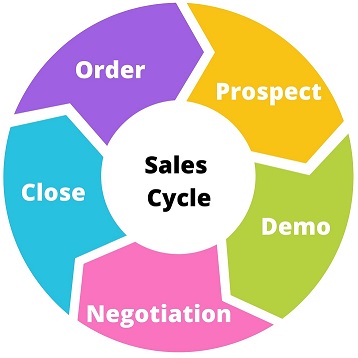This is one of the commonly asked questions from sales professionals as well as entrepreneurs who are getting into sales for their startup.
Let us explore more about the Sales process and the need for it in detail
What is a Sales Process?
Sales process refers to the well-defined steps for sales comprising various sales activities which helps in closing the deal thus leading to final conversion. The process of every organization may differ depending upon the industry in which they operate and the complexity of the business. However, there are certain common steps that are part of the sales process which are used as a reference. These are:
- Prospecting for Qualified Leads
- Pitching them the solution to generate interest
- Based on their interest, having further discussions with a detailed presentation, demo, etc.
- Negotiation on contract, pricing, and terms & conditions.
- Deal Closure
- Order, Invoicing, Payment follow-up, etc.
 |
| Sales Cycle |
Using these steps as a reference, a Sales Manager or an Entrepreneur can easily build their sales process as per the context of their organization structure and process.
Well before we proceed, if you are planning to make use of CRM software to help organize your sales process, feel free to check out ToolsonCloud Sales CRM.
Why do you need a well-defined Sales Process?
More often we may find a defined sales process is only present in large organizations and not followed religiously in small businesses or startups. When the startups start scaling up, they realize their sales process is too complex to scale fast. This is where they start looking towards building an effective sales process.
Here are some of the reasons why you may need a well-defined sales process…
1. Scalability
When you have defined steps to follow as part of your sales process, it becomes a framework or a blueprint for your team to follow. Your team can just follow the blueprint and easily close the deal faster compared to when each of the sales representatives tries to follow their own approach which might work or might not.
2. Easy to Learn, Train, Mentor
Having a clear process that is followed across the team helps your team to easily learn that and they are equipped to easily train your new joiners to onboard them faster. Otherwise, if there is no process, whenever you assign a mentor to the new joiner, the takeaways will always be different for each new joiner and may lead to misalignment.
3. Low Customer Acquisition Cost
When you have a well-defined process, teams tend to spend less time recreating already validated experiments and focus on what works. This allows them to close more deals in a lesser amount of time which automatically brings down your sales operation cost. Lower the sales operation cost, lower becomes your customer acquisition cost. This way, you will be ready to close more deals with the same amount of sales budget.
4. Better Brand Image and Customer Loyalty
Customers often love organizations that follow a well-structured approach to whatever they do. This also includes how they sell and onboard the customers. If the sales process is streamlined and smooth, the customers will also be able to sense it based on the different sales touchpoints they experienced and how fast they were onboarded. Having a good onboarding experience always helps build a better brand image and customer loyalty. Loyal customers often become evangelists and they refer more customers to you.
I hope you liked reading this post. A good CRM tool always helps the sales team to work on a pre-planned and streamlined sales process. This also helps the sales manager keep track of the state of any particular lead so that they can pitch in to help out the team at the right moment.
If you are yet to try out a CRM tool for your team, feel free to check out ToolsonCloud Sales CRM. ToolonCloud CRM allows you to create your own sales process with the help of customizable deal pipelines and stages.

0 comments: